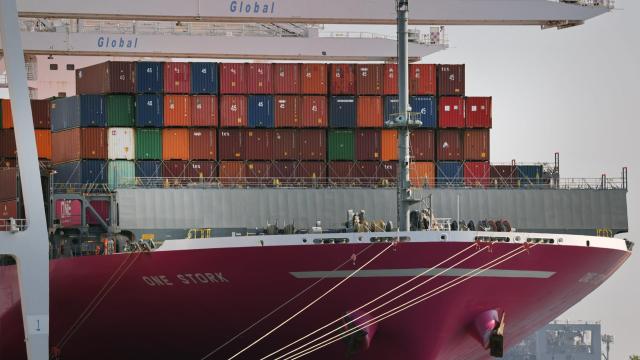Mega retailers Amazon, Walmart, Target, and IKEA have made a mint during the pandemic as millions of consumers flocked to online shopping. Those companies have seen record profits as a result, but those profits will come at a steep environmental cost.
A new report released by Stand.earth and Pacific Environment determined maritime shipping for those four companies alone accounted for some 20 million tons of carbon dioxide equivalent over the past two years, the majority of which stemmed from goods transported between China and the U.S. West Coast. The report warns these emissions could be getting worse still as supply chain crunches force vessels carrying goods to idle mid-transit.
“The retail brands that fill our homes and lives with their products bear a direct responsibility both for the pollution that the maritime shipping in their supply chains creates and for taking the necessary actions to demand emissions reductions now and 100 per cent zero-emissions shipping,” the report’s authors write.
Though the findings point a spotlight at these four retailers, they are part of a larger worldwide shift towards long-haul shipping for basic everyday goods. For context, according to the report, around 90% of global trade is transported via sea. All that shipping, in turn, may account for as much as 3% of the globe’s total greenhouse gas emissions. That would make international shipping equivalent to the world’s sixth-largest polluter if it were a country and puts it beyond even the emissions of the notoriously maligned airline industry.
On the carrier side, French container transportation company CMA CGM stood out as the single biggest polluter, accounting for 33% of emissions tied to the above companies. CMA CGM has a particularly close relationship with Walmart, and its ships accounted for 68% of Walmart’s ocean shipping emissions in 2020.
Unlike other industries that have made at least some efforts to reduce emissions, maritime shipping has received comparably less scrutiny since it was not included in the 2016 Paris Agreements efforts. The shipping industry’s practices, including wastefully sending ships full of empty cargo containers back across the seas, have also flown comparatively under the radar with the airline industry’s wasteful ghost flights with no passengers during the pandemic.
Shipping’s relatively hidden carbon and air pollution is a huge problem. Poor air quality was deemed the “greatest risk to human health” across the globe, according to a 2020 report released by the Air Quality Life Index. The report claims the average person was exposed to particulate pollution concentrations almost three times as high as what’s considered safe by the World Health Organisation, which has the not-so-pleasant effect of shedding two years off of average human life expectancy.
These are averages though, and like everything else in our modern milieu, pollution’s harms don’t apply to everyone equally. A study published in Science Advances earlier this year determined that people of colour in the U.S. experience greater than average exposure from 12 sectors of particulate matter pollution. Contributing to this is the U.S.’s long history of disproportionally building polluting infrastructure, and even hazardous waste sites, in poor, largely non-white areas.
Pollution from maritime shipping is taking a direct toll on communities near the ports of Los Angeles and Long Beach. According to the report, Target and Amazon shipping, in particular, is “directly responsible for harming these communities,” leading to higher levels of asthma and cancer-associated air pollutants. The shipping report calls on retail brands and cargo carriers to adopt more zero-emissions technology, which could have a meaningful effect on the sheer amount of pollutants poisoning the air.
